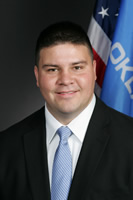In order to provide equal access and equal opportunity to people with diverse abilities, this site has been designed with accessibility in mind. Click here to view
Sen. Ralph Shortey expresses disappointment in teacher payroll deduction bill
 Sen. Ralph Shortey
Sen. Ralph Shortey
Legislation aimed at eliminating payroll deductions for state teachers passed in the Senate today by a vote of 28-16, essentially blocking educators from paying their dues to the organizations that collectively bargains on their behalf directly out of their paychecks. Senator Ralph Shortey, R-Oklahoma City, voted no on HB 1749, calling the measure unfair to teachers.
“I’m disappointed that my party supported HB 1749, as it sends a disparaging message to our state educators,” said Shortey. “Oklahoma is facing a $600 million budget hole and teachers are likely to going to be asked to go yet another year or more without raises or adjustments. I refuse to support legislation that puts yet another hurdle in place for them to jump. They have one of the most challenging jobs in the world and to deny only their group the right to pay for their membership in the organization that is looking out for their best interests is just unacceptable.”
The bill does not exclude collective bargaining, but would prohibit teachers from choosing to have their union dues deducted directly from their paychecks. Other public employees like police and firefighters would not be affected by this legislation.
“If this bill ended all state payroll deductions, that would be have been a much more logical approach,” said Shortey. “However, as it stands now, HB 179 targets only teachers and basically punishes them for choosing to pay dues to the organization that benefits their professional interests. If we’re not going to eliminate similar payroll deduction options for other groups that participate in similar collective bargaining organizations, then we shouldn’t be blocking teachers from choosing to spend their hard-earned money as they see fit.”
Shortey says it’s not the state’s place to stipulate how a teacher chooses to spend their money, and as state lawmakers, it is unacceptable to treat one organization like teachers differently than any other.
“As I’ve said previously, I’d much rather put my arm around a teacher and tell them they’re doing a great job instead of poking them in the eye with more restrictions on how they choose to spend their salary,” said Shortey.
 Oklahoma Senate
Oklahoma Senate

